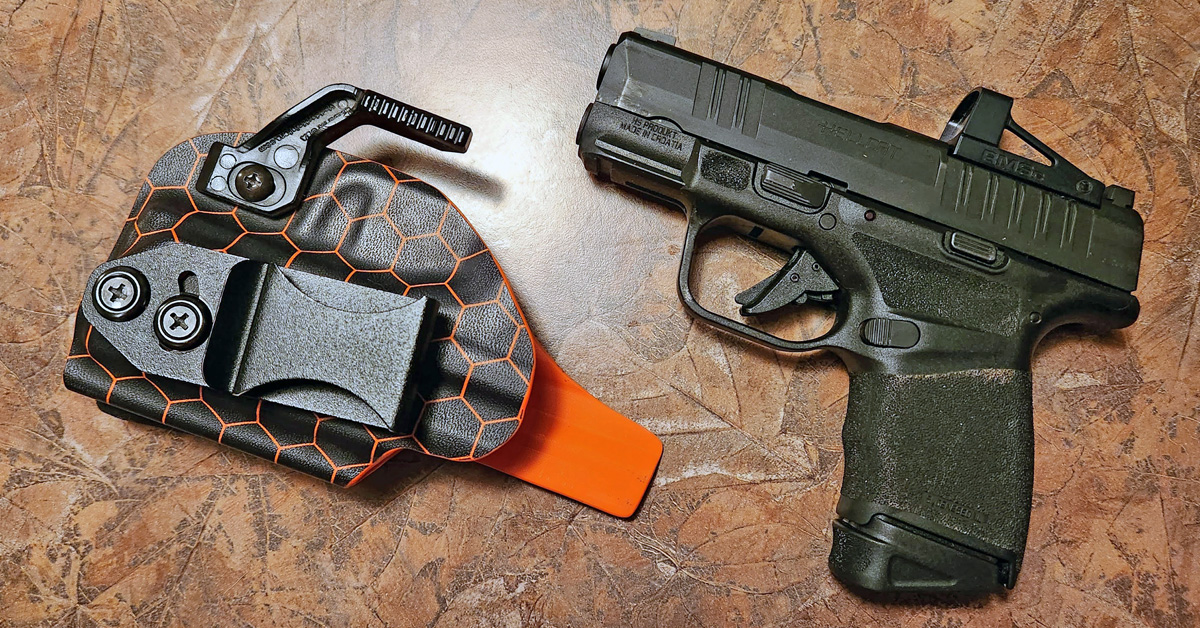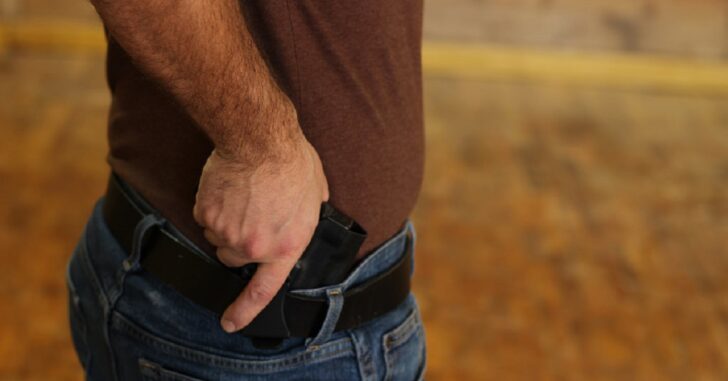Embarking on the journey of concealed carry can be empowering and offer a greater sense of personal security. However, for new concealed carriers, it’s important to navigate this realm responsibly and avoid common concealed carry mistakes that could compromise safety or legal compliance. In this article, we will highlight seven crucial mistakes to avoid as a new concealed carrier, ensuring that you start your concealed carry journey on the right foot. Let’s delve into the dos and don’ts of responsible carry.
Table of Contents
Neglecting Proper Training
New concealed carriers often overlook the significance of adequate training, which is one of the most common concealed carry mistakes they commit. It is vital for responsible carry to dedicate sufficient time and effort to acquiring critical firearm handling abilities, being aware of one’s surroundings, and comprehending the laws pertaining to self-defense.
Concealed carrying isn’t merely about possessing a firearm; it involves a deep understanding of situational awareness and decision-making under stress. Regular training sessions can immensely benefit carriers, not only in honing their shooting accuracy but also in developing the ability to quickly assess situations and make informed decisions. This kind of preparation is crucial in ensuring that if ever faced with a threatening scenario, the carrier can act swiftly and legally to protect themselves and others.
Moreover, engaging with a community of experienced carriers can provide invaluable insights and support. By attending workshops, joining local shooting clubs, or participating in online forums, new concealed carriers can learn from the experiences of others. These interactions can also serve to continuously reinforce the ethical responsibilities that come with carrying a concealed firearm, helping individuals to navigate complex moral and legal landscapes effectively.
Poor Holster Selection
One of the biggest concealed carry mistakes is choosing the wrong holster, which can lead to discomfort, inadequate firearm retention, or accidental exposure. Research and invest in a high-quality holster that offers both secure retention and comfortable carry, ensuring your firearm is always securely and comfortably positioned.
It is equally important to consider the material and design of the holster, as these factors significantly affect both comfort and functionality. Synthetic materials such as Kydex are praised for their resilience and ability to maintain shape under various environmental conditions, offering a consistent draw. By evaluating your daily activities and attire, you can select a holster that best suits your lifestyle and ensures easy access to your firearm when needed.

Furthermore, the placement of the holster on your body plays a critical role in how effectively you can draw your firearm while maintaining concealment. Experimenting with different positions and holster types during training sessions can provide practical insights into what works best for your body type and typical movements. This hands-on approach allows you to make an informed decision that enhances your comfort and confidence in carrying concealed daily.
Inadequate Familiarity with Firearm Is A Big Concealed Carry Mistakes
It’s essential to be intimately familiar with your chosen firearm. Regular practice at the range, understanding its functions and features, and performing proper firearm maintenance are critical for safe and effective concealed carry.
Becoming proficient with your firearm extends beyond basic shooting skills; it includes mastering the various safety mechanisms and knowing how to react in different scenarios. For instance, understanding how to clear a jam or malfunction quickly can be lifesaving in a high-pressure situation. Additionally, familiarity with the specific recoil, trigger pull, and sights of your firearm can significantly improve accuracy and response time when it matters most. Therefore, investing time in regular drills that mimic real-life situations can dramatically enhance your preparedness and effectiveness as a concealed carrier.
Moreover, meticulous maintenance of your firearm ensures its reliability and longevity. This involves regular cleaning, inspection, and replacement of worn components. Keeping your gun in optimal condition prevents failures that could prove disastrous in a defensive situation. Educating yourself on the particular maintenance needs of your firearm and adhering to a routine cleaning schedule can maintain its performance and safety, ensuring that it functions correctly whenever you need to depend on it.
Failure to Consider Wardrobe Choices
New concealed carriers often overlook the impact of their wardrobe choices on concealed carry. Avoid clothing that may print or hinder access to your firearm. To ensure discreet and accessible carrying, it’s essential to select garments that are conducive to concealing a firearm effectively. Opt for looser fitting clothes or specially designed concealed carry apparel. This approach helps prevent the outline of the firearm from showing through the fabric (“printing”) and allows for quick access when necessary, seamlessly blending safety with everyday practicality.
Lack of Situational Awareness
Situational awareness is one of the concealed carry mistakes that many take for granted, but is crucial for personal safety. Avoid the mistake of being complacent or distracted. Stay alert, identify potential threats, and be prepared to react appropriately in any situation.

Situational awareness goes beyond simply being cautious; it involves a constant, active evaluation of your environment to recognize and assess potential threats before they become immediate dangers. This means keeping your head up and observing the people and activities around you, rather than being absorbed by distractions like smartphones or headphones. Training yourself to notice unusual behaviors or situations that seem out of place can give you the crucial seconds needed to react effectively. It also includes being familiar with the areas you frequent, knowing the exits, and understanding the general atmosphere, so any anomalies are quickly apparent.
Furthermore, maintaining a heightened state of awareness should be a balanced approach without leading to paranoia. Practice the “Cooper Color Code,” a mental state system used by personal defense trainers, which categorizes awareness levels from white (unaware and unprepared) to red (ready to respond to a threat). Regularly training your mind to stay in ‘yellow’ (relaxed alert) allows you to enjoy your surroundings while still being prepared to shift into a more focused state of awareness if the situation demands. This method not only enhances personal security but also enriches everyday experiences by making you more conscious and appreciative of your environment.
Neglecting Legal Knowledge
Understanding and complying with concealed carry laws and self-defense statutes is paramount. Familiarize yourself with the specific laws and regulations in your jurisdiction to avoid legal complications or unintended violations.
Navigating the legal landscape of concealed carry requires a proactive approach to understanding the specific laws that apply in your jurisdiction. This includes knowing the regulations about where you can and cannot carry a firearm, the process of legally declaring your firearm in situations such as traffic stops, and the legal implications of using your firearm in self-defense. Each state can have vastly different laws regarding these aspects, and ignorance of these laws can lead to serious legal consequences including fines, criminal charges, or losing your carry privileges altogether. Keeping abreast of any changes in legislation is also crucial as firearms laws can frequently be updated or amended.
Additionally, it’s wise to engage in training courses that cover not only the practical aspects of carrying a concealed firearm but also the legal responsibilities and ethical considerations. Many organizations and training centers offer classes specifically focused on the legalities of concealed carry and self-defense laws. These courses can provide invaluable knowledge that helps ensure your actions remain within the law. They also offer scenarios and discussions that prepare you to handle real-life situations responsibly and legally. Engaging with a community of knowledgeable instructors and fellow concealed carriers can further deepen your understanding and compliance with the law.
Failure to Communicate
In confrontational scenarios, mastering effective communication and conflict resolution is pivotal in preventing escalation. Verbal and non-verbal cues play significant roles; hence, maintaining a calm demeanor and using clear, respectful language can greatly influence the outcome. Prioritizing de-escalation involves active listening, acknowledging the concerns of others, and seeking mutually beneficial solutions.
This approach not only helps in avoiding the need for physical defense but also establishes a safer environment for everyone involved. Engaging in regular training on conflict management can also enhance your ability to manage tense situations smoothly and confidently.
Conclusion
As a new concealed carrier, avoiding these seven common mistakes will set the foundation for responsible carry and personal safety. By prioritizing proper training, holster selection, firearm familiarity, situational awareness, legal compliance, and effective communication, you can navigate the concealed carry realm confidently and responsibly, empowering yourself for a safer everyday life.

